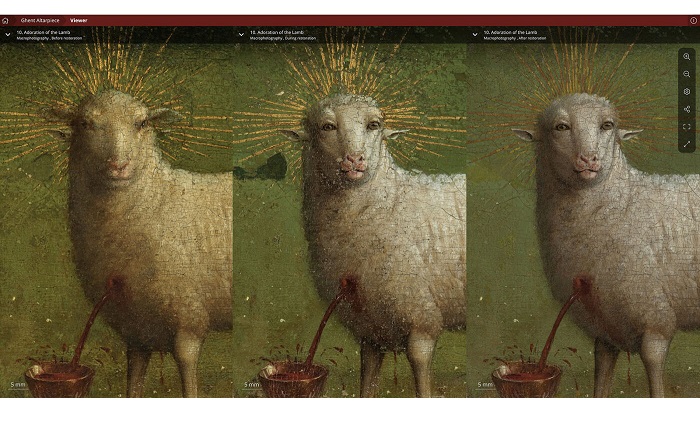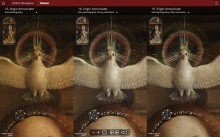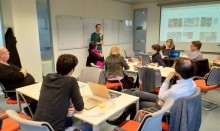
images in the Closer to Van Eyck’s website: The Lamb of God on the central panel, from left to right: before restoration (with the 16th-century overpaint), during restoration (showing the van Eycks’ original Lamb from 1432 before retouching), after retouching (the final result of the restoration).
Since 2010, a number of initiatives and grants, including support from the Getty Foundation, have enabled actions for the restoration of the renowned polyptych of the Ghent altarpiece, a beautiful artwork by Hubert and Jan van Eyck (1432). The research enabling a careful plan for appropriate restoration included analysis and digitization of the painting at the highest quality, also by the means of advanced photo techniques such as microscopic examination, analysis of paint samples and cross-sections, X-radiography, infrared reflectography and dendrochronology. The conservation treatment has been captured in full through ultra-high resolution photographic and scientific documentation, and all these images can be accessed and studied on the dedicated website Closer to Van Eyck.
A major part of the painted panels have already been treated by a team of conservators from the Royal Institute for Cultural Heritage (KIK-IRPA, Brussels, Belgium) and other partners. A second phase of conservation was recently completed, and included the restoration of the eponymous Adoration of the Lamb, principally by removing the 16th-century overpainting and all the dirt which accumulated across time, thus finally revealing the Lamb’s human-like features as they were meant to be seen according to the artists’ representation. In August 2020 an update of the Closer to Van Eyck website made available the high-resolution images taken before, during, and after restoration so to allow art students, researchers and all the users to zoom-in and to compare the results.
The Closer to Van Eyck website is designed and developed by Universum Digitalis, Brussels.
Visit: http://closertovaneyck.be/
Read the full article by Alexandria Sivak on Getty’s blog






 If you have interesting news and events to point out in the field of digital cultural heritage, we are waiting for your contribution.
If you have interesting news and events to point out in the field of digital cultural heritage, we are waiting for your contribution.
























